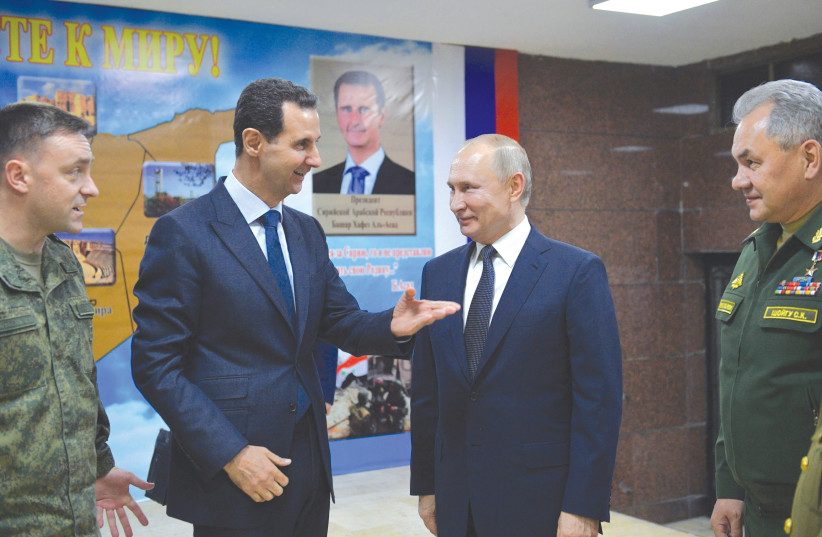Putin happy to remind rivals of his control over Syria
https://arab.news/bwtgx

The Syrians all noticed, with social media abuzz with comment, most of it mocking. For the second time during the Syrian crisis, President Vladimir Putin of Russia this month visited the country and the Syrian president was summoned to meet his overlord at a Russian base. Think about it. Even in his own country, in Syria’s own capital Damascus, Bashar Assad had to go to Putin rather than receive him as he would with any other visiting leader.
It is hard to think of this as an aberration or that, as Syrian loyalists try to claim, it was just about security. The whole choreography of these occasions indicates otherwise. The first meeting of the two in Syria was back in 2017, at the Russian air base at Hmeimim. At one moment, captured on video, the Syrian president is prevented from walking next to Putin on the tarmac by a Russian soldier, who extended his arm to slow Assad down. He had to walk behind. Assad cannot complain or remonstrate. He goes through the motions, grips and grins, but he must hide his feelings well. He knows his forces were bailed out by the Russian military and that Moscow’s support is vital in his quest to re-extend his writ over the rest of Syria.
Fast forward to Jan. 7 this year and Putin even comes to the Syrian capital, but not to the presidential palace.
Another feature of these meetings is the number of Syrians. Putin is always surrounded by a coterie of Russian officials and military figures, while Assad may have only one or two Syrians accompanying him, even when in Syria. Take Assad’s visit to Sochi in November 2017. Russian footage, not highlighted on Syrian official media, shows an Assad-Putin meeting where Assad is alone with Putin and Russian generals.
All of this reinforces the image of a Russian president dismissive of the efforts of what he deems to be a largely incompetent Assad. Russian officials frequently confirm this in private. In their view, the war should have ended years ago but was held up by a Syrian failure of leadership and a lackluster Syrian army. Putin insists on keeping Assad firmly in his place for the time being.
Why, then, does Putin continue to back Assad? Putin has, from the outset, been determined to prevent the US and its allies from another regime change folly in the Middle East — not least in a country that Russia views as being in its sphere of influence. Keeping Assad in the hot seat signals that the US and the enemies of Russia failed, and Putin is delighted to remind them of that.
But Putin is not just showing contempt for Assad. He is contemptuous of Syrians and the country too. He mocks them by highlighting their vassal status, emphasizing that Russia is effectively an occupying power that pulls the strings and takes all the important decisions. Reinforcing that attitude, Russian Foreign Minister Sergey Lavrov contrasted the situations in Libya and Syria last week. “If Libya could become ‘a second Syria,’ I believe the Libyan people will benefit from this. Unfortunately, there is no statehood in Libya so far.” Nobody with any sense of respect for either Libyans or Syrians would wish Syria’s fate on another people, after more than 500,000 have been killed and more than half the population displaced. Lavrov appreciates what his boss wants to see in Libya: A central authority figure who dutifully answers to Moscow.
Putin has, from the outset, been determined to prevent the US and its allies from another regime change folly in the Middle East.
Chris Doyle
Assad makes token signs of rebellion largely by playing Russia off against Iran. Yet, even here, the Iranian leadership is hardly respectful. Syrians did not fail to notice the absence of the Syrian flag when Assad met President Hassan Rouhani in Tehran last February. The Iranian flag was there as usual but, in contrast to meetings with other heads of state, the flag of the visiting leader’s nation was clearly absent.
Iran lacks Russia’s military muscle and diplomatic clout. Putin knows that and will continue to leverage this in his dealings with Damascus. Yet, as various countries across the Middle East glance northward to Moscow, alarmed at the capricious and haphazard nature of Trump’s decision-making, they should be cautious of turning their back on Washington and instead being too closely embraced by the Russian bear. It could be an embrace that is suffocating.
- Chris Doyle is director of the London-based Council for Arab-British Understanding. Twitter: @Doylech









































